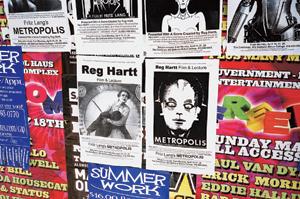If you’ve lived in Toronto for any length of time, you’ve definitely seen a Reg Hartt poster. They’re impossible to miss: stark white and black pages that trumpet the latest classic film’s arrival at Hartt’s in-home theatre, The Cineforum.
Even now, in the age of glossy full-colour postering campaigns, Cineforum flyers stand out with their vintage, just-off-the-photocopier feel, evoking a feeling of indie years past when anyone with a black marker, scotch tape and some pocket change could advertise their event via the street telegraph. Which, as Hartt himself points out, was always the point.
“Look, the Supreme Court defended postering as freedom of speech for the individual,” he says. “It’s meant for people who can’t afford print or media advertising. So if you want to put up a flyer advertising a yard sale or concert or any event you’re doing, you have the right to do that.
“But that’s for you, not for Cineplex Odeon or Coca-Cola. The people who defended that right didn’t do it so corporations could come in, dominate the speech and take over in a hoggish, piggish way. It’s as they say: the person gets the freedom, and the mob comes in and takes it away.”
Despite the encroachment of Big Corporate into grassroots advertising, Hartt still goes out every week, putting up his 8×11 posters and meeting with the public. After decades of showing, discussing and promoting classic films, he’s gained notoriety as one of the city’s genuine eccentrics. Countless numbers of us have made our way to The Cineforum to view some little-known gem, wondering if it would be preceded by one of Hartt’s legendary lectures. But, as film critic, author and television personality Richard Crouse points out, this, too, is part of Cineforum’s enduring appeal.
“I used to go often,” says Crouse, now seen regularly on CTV and heard on Newstalk 1010 every Saturday afternoon. “I’d always bring a sandwich because you never knew if Reg was going to talk for two hours or two minutes before a movie. But that’s part of the fun.”
Hartt’s journey to knowledge followed a typically skewed path. He left his Sault Ste Marie home at 17, coming to Toronto with little more than the change in his pocket and a desire to immerse himself in big-city life. He was young, gay and naive, going home with an older gent his first night in the Big Smoke and basically living a life that would make any dull, “right-minded” person fall over dead from shock. Hartt was in his element. “My life had begun,” he chuckles.
Rochdale College was the perfect fit for the young enthusiast. The student-run education collective was notorious for its lefty politics and drug culture, but it offered Hartt the opportunity to meet other like-minded artists.
“It was something to me that it wasn’t to anybody else,” he remembers fondly. “It was Hell’s Kitchen, where you can brew up really good shit. It was where things were happening.”
From there, Hartt opened his first cinema, The Public Enemy, smack in the middle of what is now an ultra-posh block of Yorkville. There he showed all sorts of counter-culture films, including the now legendary Boys in the Sand, a deliriously risqué art-porn flick that still holds up as a natural, unstaged portrayal of men having sex with each other. It was 1972 and gay culture was still very much on the down-low. But there was Hartt, putting up posters to bring in the crowd. It’s somewhat surprising that he survived the experience without assault or jail time.
“I was too stupid to be scared,” he laughs. “It was just fun. I was doing something radical. All the voices that were for keeping the world that way it was were outraged, of course. People don’t realize how far we’ve come since then.”
Despite the progression of years, there’s still the occasional bout of outrage levelled at Hartt. There was the balls-out, take-no-prisoners turf war between him and Doctor Jamie’s postering service, with accusations of threats, libel and more flying betwixt the two camps as they vied for postering space. There’s also the occasional protest when Hartt screens controversial films on subject matters like homosexuality, Hitler or Justin Bieber
“I used to periodically get phone calls in the middle of the night saying that someone like me deserves to die,” he says. “And I thought the Nazi movement was dead and buried until I showed Leni Riefenstahl’s Triumph of the Will. When Hitler stepped off the plane at Nuremberg a bunch of them got up and saluted.”
The Bieber scandal was far more subdued, with some patrons complaining when Hartt substituted the teen terror’s tunes for the original soundtrack of Valentino’s classic silent film Monsieur Valentine. Hartt remains unrepentant. “What the hell, why not?” he asks. “Justin Bieber came out of nowhere and is still out there doing it. I know what that’s like. I came out of nowhere, a kid in this city with nothing, and I made my own life. So good for him!”
Detractors or boosters aside, it’s impossible to deny that Reg Hartt and Cineforum have made, and continue to make, a bold impression on Toronto’s indie art scene. That he’s been doing it since the 1960s is admirable. That he continues to do it in the age of sparkly vampires in IMAX is downright astounding.
“Reg is someone we should value because he’s so passionate about these classic films,” Crouse says. “He still represents a counter-culture point of view in a city that has, in a lot of ways, moved beyond that. Reg represents that in living, breathing obstinate form, the kind that won’t give up. You gotta love that.”
For more information, reviews, showtimes and musings, visit cineforum

 Why you can trust Xtra
Why you can trust Xtra


